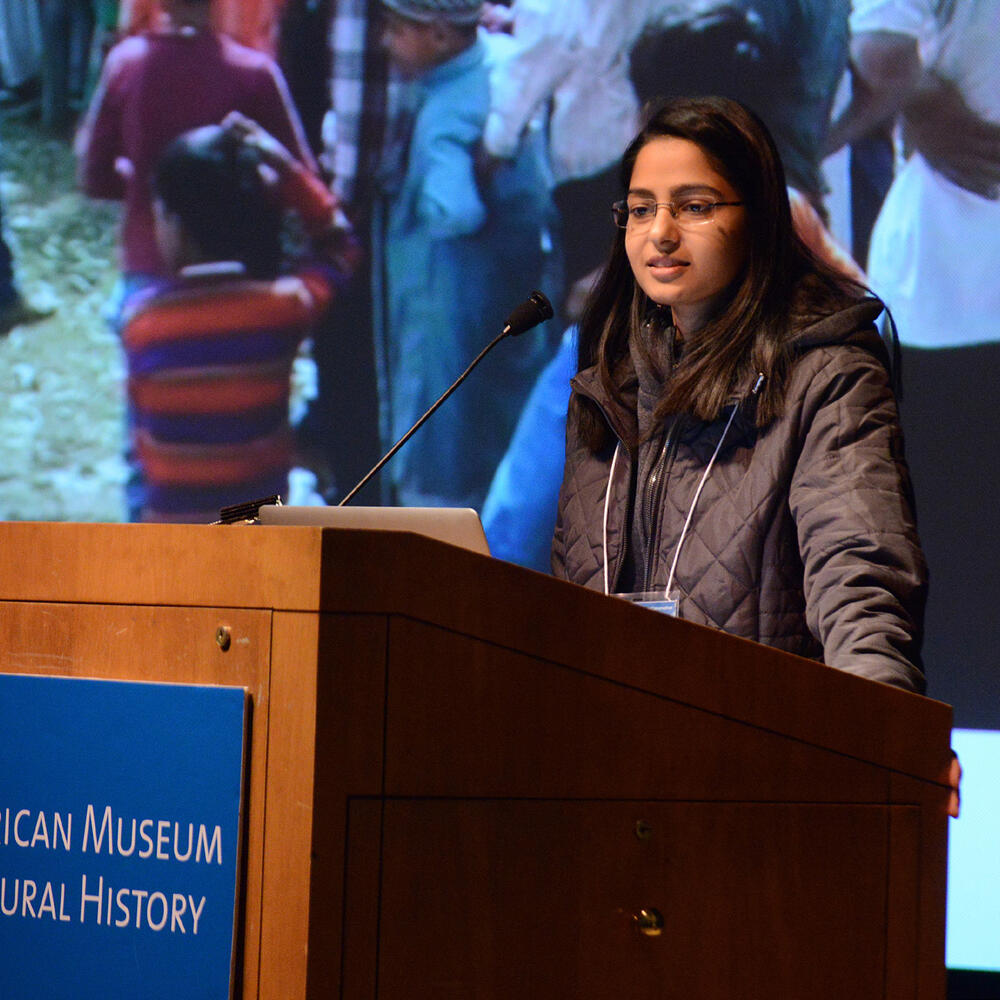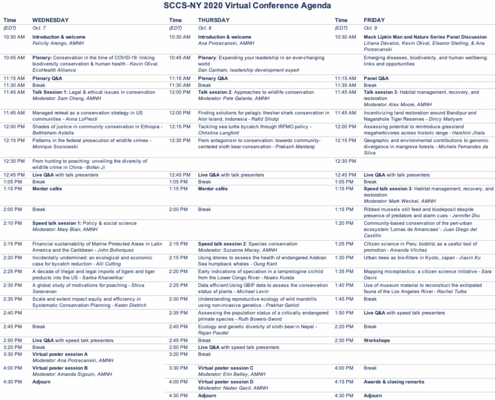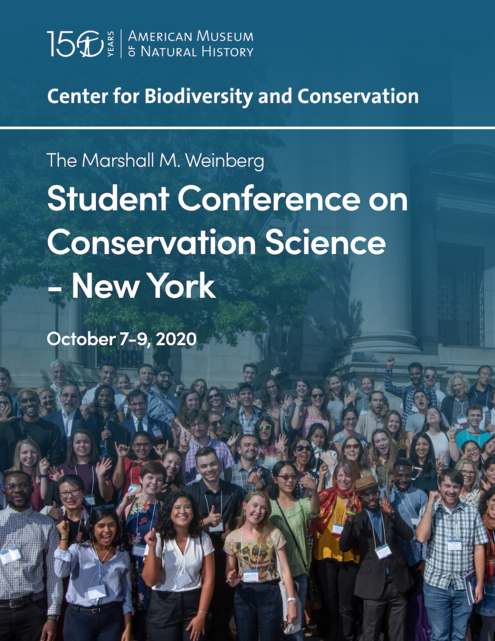SCCS-NY 2020
The Center for Biodiversity and Conservation and its partners invited students, postdocs, and early-career professionals to take part in the 11th annual Student Conference on Conservation Science – New York (SCCS-NY), which was an entirely virtual meeting.
As a part of the only international series of conservation conferences featuring students, SCCS-NY provides opportunities for emerging scientists to professionally network, gain experience, and present and get feedback on their work. Interactions with peers as well as leaders in science, policy, and management will encourage collaborations, inspire further research, and create lasting professional connections.
“This is the only conference where I’ve seen mentorship being provided to students, and this is absolutely amazing. The feedback is very helpful and a chance to talk to mentors during lunches and during breaks is extremely valuable.” - Ph.D. Student


SCCS-NY 2020 agenda at-a-glance

SCCS-NY 2020 official program
*note all times are Eastern Daylight Time (EDT)
2020 Plenary Speakers
Conservation in the time of COVID-19: linking biodiversity conservation and human health
Plenarist: Kevin J. Olival, Vice President for Research, EcoHealth Alliance, New York
Dr. Kevin J. Olival is Vice President for Research at EcoHealth Alliance, a New York based organization committed to both wildlife conservation and pandemic prevention. His research over the last 17 years has focused on understanding the drivers of zoonotic disease emergence and viral diversity in wildlife using a One Health approach, with a focus on bats and bat-borne pathogens. Dr. Olival has been at the forefront of disease ecology research on Coronaviruses in Southeast Asia, China, and Western Asia/Middle East; Nipah virus in Bangladesh and Malaysia; and Filoviruses in Asia. Dr. Olival was one of the lead scientists on the 30-country USAID PREDICT project helping to oversee modeling and data analysis for disease forecasting and to prioritize surveillance for emerging viral zoonoses. Dr. Olival graduated with distinction from Columbia University in 2008 with a Ph.D. in Ecology and Evolutionary Biology and a M.A. in Conservation Biology. Dr. Olival has a passion for turning rigorous science into effective public policy, and aims to keep this as a central goal of his career path.
The COVID-19 pandemic has destroyed families, societies, and economies around the world and led to >1M deaths. Yet, SARS-CoV-2 is just one of many pathogens to have recently "spilled over" from wildlife to people, and these emerging infectious disease events are increasing in frequency with roughly ~2-3 new diseases each year. Why and how are new diseases emerging? The answer is simple (even if the process may be complex): increasing, anthropogenic ecological changes (e.g. deforestation, wildlife trade, climate change) are providing growing opportunities for human-wildlife interactions and viral spillover. This talk will address how biological conservation and virus surveillance and pandemic prevention research are entirely synergistic, and should not be viewed as opposing. The relatively new, multidisciplinary field of One Health research is advancing rapidly – linking ecologists, conservation biologists, virologists, veterinarians, molecular biologists, and public health scientists in new and exciting ways to understand threats to wildlife and human populations. The COVID-19 pandemic has simultaneously provided challenges to on-the-ground conservation research, and opportunities to improve public awareness of the global ecological crisis and its linkages with human health. Dr. Olival will address these issues by charting his own personal career path and research experience.
Plenary Speaker: Kevin Olival
Expanding your leadership in an ever-changing world
Plenarist: Dan Canham, leadership development expert
Dan Canham is a leadership development expert with over 20 years of experience in technical training for leaders. He has spent the last 8 years working across the global conservation community with federal and state agencies, non-governmental, and international organizations, helping build the collective leadership capacity of individuals, teams, and organizations to take on the most difficult challenges the conservation community faces. Using the classroom as a real-time laboratory, Dan helps students to better understand themselves and how they relate to others, take greater risks, be vulnerable, present, and to be more emotionally intelligent in the service of leading change. Dan has fully integrated the concept of Vertical Development in his courses, whereby participants not only add new knowledge, but expand their vision to see challenges differently, and to use the knowledge they have in new and exciting ways. Dan holds a Master’s degree in Management from New England College, a certificate in the Art and Practice of Leadership from Harvard’s Kennedy School of Government, and he is certified in Organizational Consultation and Change Leadership from Georgetown University. The uniqueness of the leadership programs Dan has developed has been recognized globally as impactful and transformative.
The pace of change in the world is incredible. As the earth’s population expands and wealth in some areas increases, so do the demands on natural resources. These challenges are complex, interwoven and often, unknown. Those who step into the realm of conservation are fighting a difficult fight, but not an impossible one. These new conservation challenges require new approaches to leadership. One that is adaptive and experimental. One that embraces risk and is willing to fail in the pursuit of success. During the talk, we will discuss reframing what leadership is, and how to develop the new skills and ideas needed to expand your adaptive leadership capacity. We will also discuss each person’s greatest resource…themselves. Each of us has tremendous unused capacity. Understanding how to unleash our potential is critical to developing our leadership capacity and make an impact on conservation. Finally, we have to engage and empower others. We need to engage different groups, including those who don’t agree with conservation’s goals. Without others, it becomes nearly impossible to progress on conservation’s biggest challenges. Dan Canham will share his leadership journey and personal insights on overcoming challenges, embracing change, and keeping a positive attitude throughout it all.
Plenary Speaker: Dan Canham
Major funding for the 2020 Student Conference on Conservation Science - New York (SCCS-NY) has been provided by Marshall M. Weinberg. In grateful recognition of his longstanding generosity toward the Center for Biodiversity and Conservation, this year’s SCCS-NY is presented in his honor.
The Center for Biodiversity and Conservation thanks our SCCS-NY partners:
and conference contributors:
Pace University